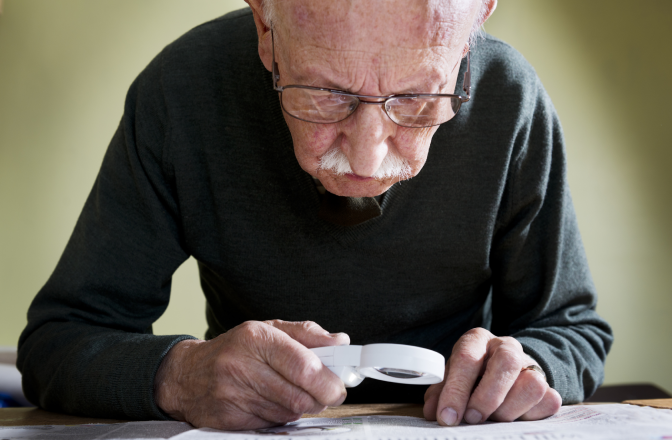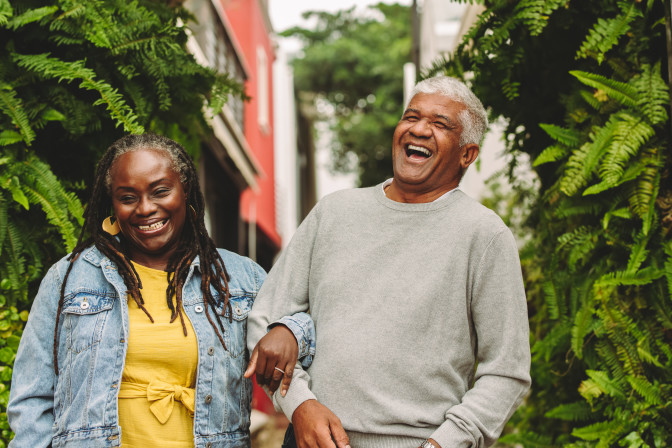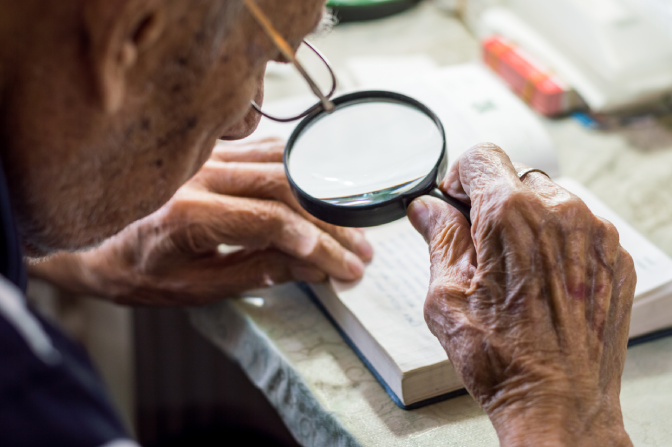Buy One, Get One 50% OFF Eyeglasses
* Restrictions apply. Ask a Team Member for details.
Low Vision Specialists in Alabama

Get Treated For Low Vision at EyeCare Associates
If you are experiencing blurry vision and are unable to perform everyday activities without help from corrective eyewear or contact lenses, you may be suffering from low vision.
Low vision is most often a symptom of another eye condition, such as age-related macular degeneration, cataracts, diabetic retinopathy, or glaucoma.
This makes it important to visit an eye doctor as soon as you start to experience low vision. The Alabama eye doctors at EyeCare Associates will examine your eyes to determine the cause of the condition and provide treatment.
Even if you are suffering from changes in your vision, it's not too late to get an eye exam and begin your road to recovery.

Find Low Vision Specialists in Alabama at EyeCare Associates
If you are suffering from blurry or low vision, it’s not too late to make an appointment and begin your road to recovery. The doctors at EyeCare Associates can help diagnose your low vision and provide eye care at each of our Alabama eye clinics.
We have over 30 eye clinics across the state of Alabama. This gives you access to affordable eye care and low vision treatment no matter where you live in Alabama. Many of our locations are conveniently located near the cities of Birmingham, Hoover, Huntsville, Mobile, and Tuscaloosa.
Vision Rehabilitation Services in Alabama - EyeCare Associates
After receiving a comprehensive eye exam to confirm a low vision diagnosis, the optometrists at EyeCare Associates will develop an eye care treatment plan that’s customized for you and your vision rehabilitation needs.
Rehabilitating your vision is like physical therapy - but just for your eyes. There are a large variety of different rehabilitation services available at your local EyeCare Associates.
There are a few steps to beginning a vision rehabilitation program. Your optometrist will first evaluate your vision and conduct a few eye examinations to assess your visual function. After this, the optometrist will then create your custom rehabilitation plan. This visual rehabilitation plan might include environmental modification and/or the use of low vision devices.
The goal of low vision rehabilitation is to help preserve your sight from further progression. It’s important to understand that low vision rehabilitation cannot reverse any vision loss that has already occurred but it can help you preserve your sight.
Symptoms of Low Vision
If you are experiencing any of the following symptoms, be sure to schedule an appointment with your eye care provider. This exam will allow us to diagnose and treat your low vision. Some symptoms of low vision are:
Loss of central vision - a blur or a blind spot in the center of your visual field but your peripheral vision remains
Night blindness – Are you unable to see outside at night or in dimly lit areas?
Loss of peripheral vision - also known as tunnel vision, this is when one loses side vision in both or one eye or when one cannot see above or below eye level
Blurred vision - when the visual field is out of focus even with corrective lenses
Hazy vision - field of vision seems to be covered with a film or glare
Understanding Your Low Vision Treatment Options
Unfortunately, low vision is usually permanent. However, the expert eye care team at EyeCare Associates may be able to help you improve your vision or prevent it from getting worse.
Vision is often labeled as the most important sense humans have. According to a 2016 survey completed by the National Federation for the Blind, Alabama has over 150,000 people experiencing a visual disability.
Low vision impacts your quality of life, and can make it more difficult to perform everyday activities such as driving or reading. You should pursue low vision rehabilitation as soon as you experience any loss of vision.
Choosing the right vision rehabilitation team is essential. It is important for you and your optometrist to discuss the low vision services that are best for you and your unique needs.
Our providers at EyeCare Associates are here to help you rehabilitate your eyesight.
Vision rehabilitation is the standard of care for people suffering from vision loss. Our eye care professionals across Alabama create a safe, friendly environment for all our patients. Each of our EyeCare Associates eye clinics understands the importance of your vision and how it affects your quality of life.
Your team of eye care professionals may recommend you use low vision aids such as telescopes, microscopes, or hand magnifiers. These devices are designed to help you see better as you go through your day.

Schedule A Low Vision Exam at EyeCare Associates in Alabama
Low vision can be a sign of a more serious eye condition that could lead to worsening vision or vision impairment. Maintain your independence and take control of your eye health by scheduling an eye exam at your local Alabama EyeCare Associates.